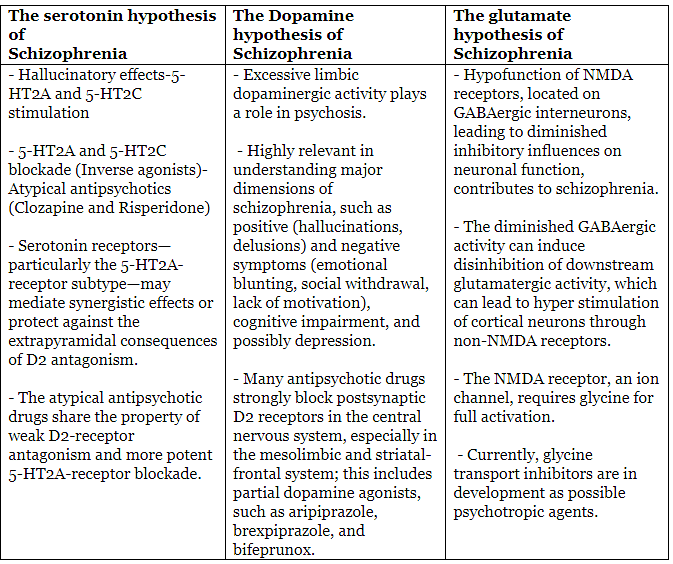Schizophrenia | Medical Science Optional Notes for UPSC PDF Download
| Table of contents |

|
| Schizophrenia |

|
| Schizophrenia-Hypothesis |

|
| Types of Schizophrenia |

|
| Schizophrenia-Diagnosis and Management |

|
Schizophrenia
Schizophrenia typically onset occurs in late adolescence and early adulthood, typically between the ages of 15 and 20 years.
Neurotransmitters in schizophrenia
- Increased dopaminergic activity (most important)
- Increased serotonin
- Decreased GABA
- Variable change (Increased or decreased) glutamate
- Increased norepinephrine.
Schizophrenia-Hypothesis

The symptoms of schizophrenia may be divided into the following 4 domains:

Kurt Schneider described the First Rank symptoms of schizophrenia, which include:
- Perceiving audible thoughts (hearing one's own thoughts)
- Hearing voices engaged in arguing or discussing (also known as 3rd person hallucination)
- Experiencing voices that provide commentary (hallucinatory voices offering a continuous commentary on the person's actions, thoughts, or behaviors)
- Somatic passivity experience (a sensation where the patient feels that their actions are not under their control, but rather controlled by an external force).
Types of Schizophrenia
Schizophrenia has traditionally been classified into two types
- Type I (reactive or acute): It is distinguished by an abrupt onset, positive symptoms, a favorable response to antipsychotics, a promising prognosis with a reversible outcome, and an association with dopamine overactivity.
- Type II (process): It is characterized by a prolonged course, negative symptoms, a limited response to antipsychotics, an unfavorable prognosis and outcome, and no dopamine overactivity but observable structural brain changes (e.g., dilated ventricles) on CT scan.
Schizophrenia-Subtypes


Schizophrenia-Diagnosis and Management
Diagnosis:
Patients can exhibit positive symptoms (like conceptual disorganization, delusions, or hallucinations) or negative symptoms (such as loss of function, anhedonia, reduced emotional expression, impaired concentration, and diminished social engagement). To meet formal diagnostic criteria, they must have at least two of these symptoms persisting for a 1-month period and continuous signs for a minimum of 6 months.
Management:
Medications classified as antipsychotics (also referred to as neuroleptic medications or major tranquilizers) alleviate the positive symptoms of schizophrenia and serve to prevent relapses. Clozapine is considered an exemplary "atypical" antipsychotic agent, typically administered orally at doses ranging from 150 to 600 mg. Atypical agents demonstrate enhanced efficacy in addressing negative symptoms and enhancing cognitive function.
Psychosocial treatment is essential:
The psychosocial treatments that have been extensively studied include social skills training, cognitive-behavioral therapy, cognitive remediation, and social cognition training.
Antipsychotics-Side effect profile



Schizophrenia-Prognosis


Schizophrenia - Repeats
Enlist causes of Schizophrenia. Mention briefly its clinical subtypes, differential diagnosis and drug treatment. (2002)
|
7 videos|219 docs
|
FAQs on Schizophrenia - Medical Science Optional Notes for UPSC
| 1. What are the different types of schizophrenia? |  |
| 2. How is schizophrenia diagnosed? |  |
| 3. What are the common symptoms of schizophrenia? |  |
| 4. How is schizophrenia managed or treated? |  |
| 5. Can schizophrenia be cured? |  |

|
Explore Courses for UPSC exam
|

|

















